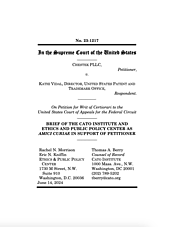Learn more about Cato’s Amicus Briefs Program.
When federal agencies choose to make binding policy, those agencies are typically required to give interested parties an opportunity to influence the development of such rules through a process known as “notice‐and‐comment rulemaking.” To promulgate these binding rules, agencies are required by the Administrative Procedure Act (APA) to publish a general notice of proposed rulemaking and then give interested persons an opportunity to submit written data, views, or arguments for the agency to consider. Agencies may not ignore these comments; rather, they must respond to any relevant, significant issues that are raised by interested parties.
These procedures exist for good reasons. The notice‐and‐comment process facilitates the important democratic value of allowing interested parties and the public to participate in deliberative lawmaking. This participation is critical to the creation of rational rules that are not arbitrary or capricious. And public participation guards against imposing unnecessary costs on regulated parties due to harms in a rule that an agency could have been alerted to.
But because of the hurdles that the notice‐and‐comment process places on agency rulemaking, agencies are incentivized to exploit potential exceptions to notice‐and‐comment rulemaking where they can. That is what happened in this case.
The Patent and Trademark Office (PTO) is authorized to “establish regulations” that “govern the conduct of proceedings in the Office.” This provision authorizes only procedural rules, which would normally be exempt from Notice and Comment. But in 1999, Congress amended a statute to specify that PTO regulations “shall be made in accordance with” the portion of the APA which prescribes notice-and-comment requirements.
Yet the PTO has argued, and the Court of Appeals for the Federal Circuit has accepted, that this amendment essentially changed nothing because the APA generally exempts procedural rules from notice and comment and because all of the PTO’s rules are procedural. On this theory, PTO rules can continue to be issued without notice and comment and still be issued “in accordance with” the APA provision that the amendment identified.
Now a petition has asked the Supreme Court to review this question, and Cato has filed an amicus brief supporting that petition, joined by the Ethics and Public Policy Center. In the brief, we explain why the right to notice‐and‐comment rulemaking is not a bare and meaningless procedural right. Rather, when agencies circumvent notice‐and‐comment rulemaking, it imposes real costs on parties, and public policy suffers. We urge the Supreme Court to review the case and find that the amendment requires the PTO to put its proposed rules through the notice-and-comment process.

This work is licensed under a Creative Commons Attribution-NonCommercial-ShareAlike 4.0 International License.

